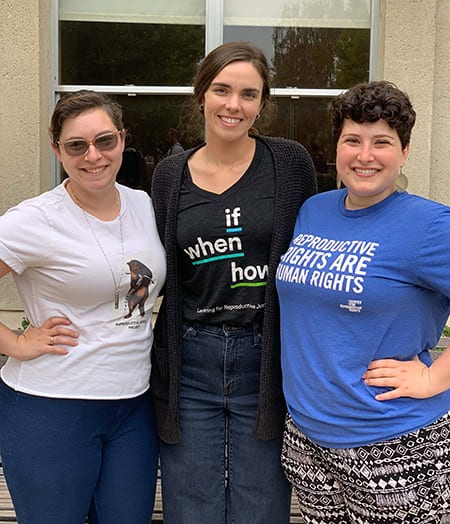By Andrew Cohen

While working at Ms. magazine in 2014, then her “dream job,” Simone Levine ’21 had an epiphany after the Supreme Court’s decision in Burwell v. Hobby Lobby Stores limited access to contraceptives. “I realized I wanted to work in law and policy, and to spend my career in the reproductive justice field,” she says.
Levine interned for NARAL and the Center for Reproductive Rights, published a paper on abortion and religion in Ireland and the United States, wrote her senior thesis on targeted regulation of abortion providers, and volunteered as managing editor of the Centre for Feminist Foreign Policy’s online journal.
During her first month at Berkeley Law, she joined the Reproductive Justice Project (RJP)—one of the school’s 30-plus Student-Initiated Legal Services Projects. This year, Levine leads the group with classmates Michelle Ziperstein and Savannah Wheeler, and together they’re expanding its focus and reach.
With escalating attacks on reproductive rights across the country, RJP has grown to 21 students spread across 14 projects assigned by six organizations. Supervised by the law school’s Center on Reproductive Rights and Justice, students work on either reactive litigation or proactive policy efforts.
RJP’s mission focuses on three main areas: the right to have children, the right to not have children, and the right to parent one’s children with dignity in a safe and healthy environment. Levine, Ziperstein, and Wheeler chose projects across all three to help students learn about reproductive justice topics beyond abortion and birth control.
“Historically, the abortion and birth control movements have shaped their strategic priorities by emphasizing white women’s experiences,” Levine says. “Reproductive justice, as compared to reproductive rights, aims to center the experiences of people of color and other groups left behind.”
The work includes drafting research memos, lobbying in Sacramento, and supporting legislative efforts nationwide. Students assist organizations around the country that protect and advance women’s rights, in areas including research on Black maternal health, policy proposals for sex education in high schools, family separations at the border, and abortion clinic compliance with search warrants.
RJP also partners with Berkeley Law’s If/When/How chapter to bring in speakers, raise funds for local abortion and domestic violence clinics, and network with lawyers.
“The most rewarding aspect of RJP is how it has become so multifaceted,” Ziperstein says. “Not only do we have projects targeting abortion access … we’ve incorporated projects on women of color, people with intersex traits, and international policy advocacy.”
Digging in, branching out
Abortion rights remain a key priority, especially amid growing federal and state government steps to restrict them (a recent Guttmacher Institute analysis says 29 states demonstrate hostility toward abortion rights). Students work to counteract targeted regulation of abortion providers, procedure bans, and timed cutoffs.
The upcoming Supreme Court case of June Medical Services v. Gee could undermine the Court’s 2016 decision in Whole Woman’s Health v. Hellerstedt and further erode abortion access.
“As state laws become increasingly complicated and strict, it’s vital that clinics have access to attorneys to help them navigate these minefields,” Levine says. “And as some states make it more difficult to access abortions, other states—California included—must work harder to set a better standard and remove those barriers.”
Long range, the group leaders hope to increase the number of Berkeley Law’s reproductive justice classes, professors, and events.
“Reproductive justice involves our healthcare system, education system, and carceral system, to name a few, and it intersects with racial justice, economic justice, environmental justice, and much more,” Wheeler says.
Wheeler spent years volunteering with the New Orleans Abortion Fund, providing resources and financial counseling for clients who faced economic barriers to accessing abortion and facilitating funding pledges to help cover the costs of their care. Ziperstein pursued a research-based graduate degree in chemistry, studying the metastatic patterns of breast cancer, and participated in many breast cancer awareness fundraisers.
Together with Levine, also the president of Berkeley Law’s If/When/How chapter, they have found an ideal venue for their growing legal skills.
“This group is the perfect outlet for all my frustrations with the constant attacks against reproductive autonomy,” Levine says. “I have high hopes and high standards, and I’m thrilled that running RJP has met all of them.”